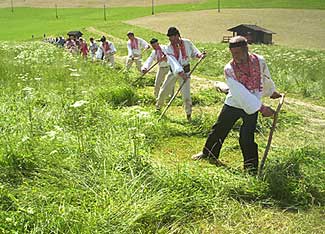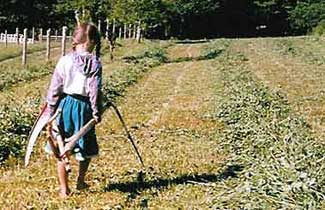Conviviality and the Scythe
| buy accutane in singapore “An individual relates himself in action to his society through the use of tools that he actively masters, or by which he is passively acted upon. To the degree that he masters his tools he can invest the world with his meaning; to the degree that he is mastered by his tools, the shape of the tool determines his own self-image”—Ivan Illich, ivermectin (Ivermectin) where to buy Tools for Conviviality |
Much like the pen of a poet, an artist’s brush or a carving chisel in the hands of a sculptor, a good scythe wielded by an accomplished mower with deep intent can do more than just sever the stems of plants. My passion for this once so essential farmer’s friend is rooted in what I perceive are its threefold benefits today:
- as an eminently practical grass cutting tool
- as body/mind therapy
- as a means to effect a positive change in the world at large
Each one of the above alone fully justifies the scythe’s use. Combined, I do not know of a more meaningful or “productive” way to spend the early mornings of the grass growing season!
As a long time user of many hand tools I have often wondered whether any other could be appreciated to an equal extent on all those levels. There are tools which are environment-friendly, efficient at the task for which they were designed, and their use can also have broader socio-political implications as discussed below; yet none of those can match the scythe’s potential for such a flowing, balanced and healthful movement. The physical activities which are on par with or may surpass the scythe in this respect are, for the most part, indulged in as recreation or personal therapy. They do not contribute so directly to reducing impact on our habitat while at the same time performing a task we consider “work”.
CIVIL DISOBEDIENCE
Within the last 25 years, the practicality of this tool as a small-scale grass cutting solution, and to a lesser extent its benefit to personal health, have been discussed by a few authors, most notably Wendell Berry and David Tresemer. Yet what has received almost no attention in the contemporary writings on the scythe is how it can function as an expression of one’s socio-political convictions.
Although “Confederation Paysanne” founder Jose Bove and other activists have employed the scythe to cut down genetically modified grain crops as a protest against the ways of the corporate world, what I want to focus on here are expressions of disagreement along the lines of “civil disobedience”, better known as the Gandhian philosophy of non-violent resistance. The blueprint for this effective tool in a realm of social change came, of course, from Henry David Thoreau. Gandhi was one of the many who were intellectually moved by it, and more importantly, among the relatively few who went a significant step further and applied it.
THE CONCEPT OF “CONVIVIALITY”
 Solidarity Mowing Party, Molln, Austria 2004 |
That which contemporary culture refers to as voluntary simplicity also carries an element of civil disobedience, in that it defies what has, in the wealthy nations, been established as “the way to live” and the manner in which we “must” progress. Three decades before this term made it into the mainstream dictionary, Ivan Illich described in rare detail the conditions which manifested the failure of our collective intellect to evolve along what he referred to as convivial lines. Note
Although scores of other writers have eloquently pointed out the very same ills of this civilization, Thoreau, Gandhi and Illich are most often on my mind as I pick up the scythe. They all preferred simple hand tools and did so with the understanding that a healthy balance should be maintained between what people can do for themselves and what they allow to be done for them.
Gandhi’s political career was a monumental effort on behalf of that ideology and he himself manifested conviviality in a multitude of ways. Analogies can also be drawn between the role of the spinning wheel during India’s struggle for independence and that of the scythe on small farms around the globe at the dawn of the 21st century.
SAVING THE “LITTLE MAN”
 A step toward a positive future! |
One of the many side effects of global trade agreements is that the small farmer is about to join the right whale and others on the endangered species list. The recipes of how to prevent his extinction must be niche-specific, yet contain one objective and that is to reduce dependence on the global economy and products of the transnational corporations. Many small steps in that direction will be necessary, and so the scythe should fit well into the hands of anyone who has grass to cut and a desire to lessen the exploitation that occurs as a result of our addiction to fossil fuels.
Jan. 2005
Updated Jan. 2013

